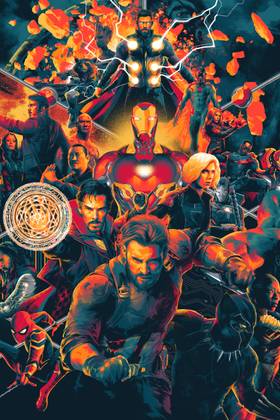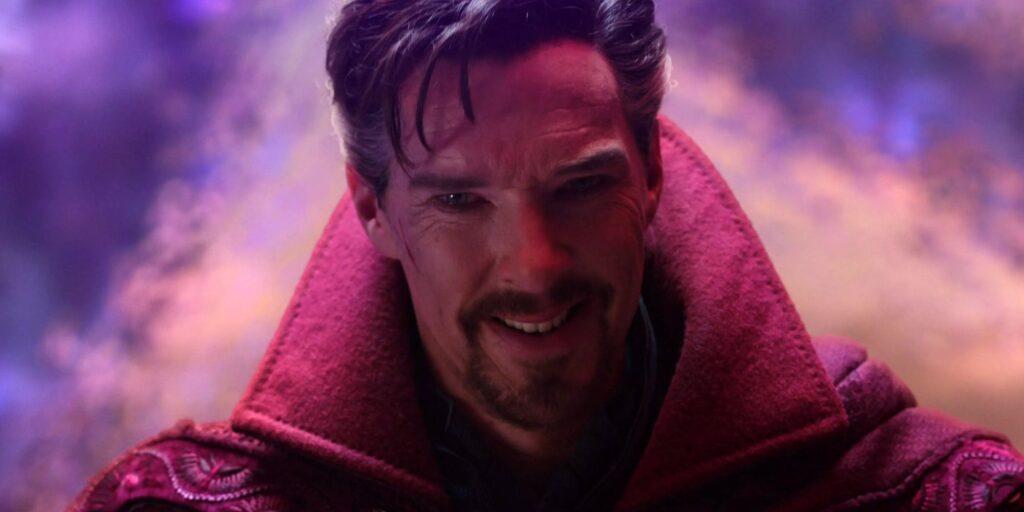The MCU is rife with deaths, although some are less sad than others. In fact, unlike the MCU’s most tragic deaths, there are plenty that are practically worthy of celebration. That is not to say, however, that they make the MCU and its sprawling narratives any less compelling.
Many of the MCU’s least sad deaths are still impactful, even if they aren’t particularly heartbreaking. At the same time, while it is always hard to feel too sad about the death of MCU canon fodder like henchmen and soldiers, some of the deaths listed below probably should have carried a little more emotional weight than they ultimately did.
10
Thanos’ First Death Isn’t Sad For Several Reasons
Thanos is one of the MCU’s most iconic villains. That is not to say, however, that he is revered. At this point, Thanos has died many times in the MCU, but the death that felt the most viscerally satisfying was his first, which occurred in Avengers: Endgame at the hands of the Stormbreaker-wielding Thor.
The first act of Avengers: Endgame saw the Avengers dealing with the immediate effects of their failure. It served as a drawn-out and agonizing reminder of Thanos’ final act in Avengers: Infinity War. Upon discovering that he had seemingly hampered any chance of rectifying their mistake, it was far easier to empathize with Thor’s explosive rage than any sadness.
9
MODOK’s Death Was Almost A Relief
Ant-Man and the Wasp: Quantumania debuted one of Marvel Comics’ most iconic and recognizable villains. Unfortunately, the creative license wielded in the creation of the MCU’s MODOK did not land particularly well with fans, as Ant-Man’s Darren Cross supplanted Marvel Comics’ George Tarleton and turned him into an overt font of comic relief.
Despite meeting his final demise in a moment of self-sacrifice, it is difficult to feel sad for the controversially characterized MODOK. The impact of his death was additionally dampened by the comedy surrounding it. For those hoping for a more comics-accurate rendition of MODOK in a future MCU installment, the first’s death might have felt like a relief.
8
Ego’s Death Is One Of The MCU’s Most Deserved
Ego had one of the most shocking introductions to the MCU. Not only was he revealed to be Star-Lord’s Celestial father, but he would subsequently make a mind-blowing admission: that he inflicted Peter Quill’s mother with her fatal tumor. Quill’s visceral response, opening fire on his father, was easy to empathize with, even if it was ineffectual.
Thankfully, Ego was eventually killed in his subsequent fight with the Guardians of the Galaxy. It was impossible to feel remorse for Ego, one of the MCU’s most hated and aptly-named villains, and his death restored a cosmic balance after he killed Peter Quill’s mother, making Quill and his adoptive family the most fitting group to pull the trigger.
7
Maria Hill’s Death Should Have Been Much Sadder
Maria Hill debuted in 2012’s The Avengers as the deputy director of SHIELD. She would go on to play a pivotal role in the organization and as Nick Fury’s foremost ally in the subsequent Avengers movies, as well as Captain America: The Winter Soldier, as a stalwart proponent of the Avengers and SHIELD before its collapse.
Maria Hill was a skilled and noble spy who was invaluable to Nick Fury and, by extension, the Avengers. Her death, therefore, should have hit like a ton of bricks. Sadly, when it occurred in Secret Invasion, thanks to Gravik’s shape-shifting trickery, it was sudden and unceremonious and left Hill’s MCU arc feeling undeservedly sparse.
Maria Hill’s death set a worrying precedent for Secret Invasion, which went on to be one of the most heavily criticized MCU productions. Had the show spotlighted Hill and fleshed her out more, something which was frustratingly viable within the spy thriller series, her death might have had more of an emotional impact.
6
Dreykov Is One Of The MCU’s Most Hated Villains
Dreykov is arguably in fierce competition with the likes of Ego for the title of the MCU’s most reviled villain. Dreykov was introduced in Black Widow as the morally bereft overseer of the Red Room, the clandestine Soviet program that trained mind-controlled Black Widows after seizing them as children, a nefarious process that Thunderbolts* fleshed out in heartbreaking detail.
Dreykov’s sociopathy was exemplified by his decision to turn his own daughter, Antonia Dreykov’s Taskmaster, into his greatest weapon, depriving her of all free will and routinely placing her in harm’s way. His misogyny, callousness, and egotism meant that his fiery death at the hands of Yelena Belova wasn’t even slightly sad to witness.
5
Taskmaster’s Death Was Too Abrupt
Dreykov’s daughter, Antonia, was shockingly revealed to be the MCU’s Taskmaster towards the tail-end of Black Widow before Natasha Romanoff freed her from Dreykov’s mind control. Taskmaster subsequently took her life into her own hands, though she would still find herself working for another unscrupulous mastermind: Valentina Allegra de Fontaine.
Although Thunderbolts* seemed poised to flesh out her true personality and even afford her a redemptive arc, she was unceremoniously shot in the head by Ava Starr’s Ghost during the four-way brawl at the O.X.E. Vault. Her corpse is then robbed before Yelena Belova swiftly acknowledges that she had a hard life.
Like Maria Hill, Taskmaster’s death was too sudden to evoke much emotion from the audience. Instead, her death was used as a tool to establish early stakes, negating any chance of an emotional impact by merely granting her a single line instead of any character development.
4
Ebony Maw’s Death Couldn’t Come At A Better Time
Although Thanos was already established as the Infinity Saga’s formidable arch-villain relatively early in the franchise, his threat levels received a significant boost when Avengers: Infinity War debuted the Black Order. Of its four members, Ebony Maw, with his seemingly limitless powers of telekinesis, was arguably the most dangerous.
After successfully repelling the combined might of several Avengers, Ebony Maw was able to capture and subsequently torture Doctor Strange, the Sorcerer Supreme. Thankfully, Spider-Man and Iron Man’s outside-the-box thinking removed him from the picture relatively swiftly, with his death evoking nothing but relief thanks to the threat he posed.
3
Malekith Was Too Forgettable
Thor: The Dark World was the MCU’s lowest-rated movie for quite some time, and despite being portrayed by revered actor Christopher Eccleston, its uninspiring arch-villain was largely to thank for that undesirable accolade. Malekith remains one of the MCU’s blandest villains, boasting a relatively simplistic motivation and barely any screen time.
His death, therefore, while relatively epic (being crushed by a giant warship on Svartálfheim), wasn’t at all moving. In contrast, Gorr the God Butcher’s death in Thor: Love & Thunder was one of the MCU’s most heart-wrenching, despite the film not faring much better critically than its predecessor.
2
Aldrich Killian’s Death Was A Welcome Comeuppance
Although Aldrich Killian was set up to be a sympathetic MCU villain during the flashback sequence in Iron Man 2, this aspect of his characterization became progressively less prominent. By the end of Iron Man 2, Aldrich Killian had fully embraced his villainy, announcing himself to be the Mandarin in an almost campy manner before being attacked and ultimately killed by Pepper Potts.
His final moments helped to make Killian’s death feel worthy of celebration. Although he had already engaged in nefarious practices until that point, he definitively decided against a last-minute moment of redemption. The tooth-and-nail nature of trying to kill the rapidly healing villain also helped to diminish any sadness that came with his death.
1
Doctor Strange’s Death Was Weirdly Hopeful
Avengers: Infinity War was rife with death by the end as Thanos successfully snapped his fingers and wiped half of all life from the universe. This scene was, of course, exceptionally emotional as characters like Bucky, Groot, and, perhaps most tragically, Spider-Man, disintegrated in front of their friends’ eyes.
Nevertheless, Doctor Strange’s dusting was different. Not only was he characteristically stoic about his disintegration, but his decision to relinquish the Time Stone to Thanos and consequently bring about the Snap came with a prescient assertion that this was a necessary route to defeating the Mad Titan.
While the likes of Spider-Man broke the hearts of millions with his “I don’t want to go” line, Doctor Strange’s disintegration, contrarily, came with a glimmer of hope rather than sadness. After all, there was little reason to discount his prediction, and he was ultimately vindicated as the future of the MCU was saved in Avengers: Endgame.

Created by
Kevin Feige
First Film
Iron Man
Upcoming Films
Blade, Avengers: Doomsday (2026), Avengers: Secret Wars
First TV Show
Agents of S.H.I.E.L.D.
Upcoming TV Shows
Marvel Zombies, Wonder Man, Vision Quest
Cast
Robert Downey Jr., Chris Evans, Scarlett Johansson, Samuel L. Jackson, Jeremy Renner, Chris Hemsworth, Mark Ruffalo, Edward Norton, Paul Rudd, Tom Holland, Tom Hiddleston, Anthony Mackie, Cobie Smulders, Brie Larson, Chadwick Boseman, Sebastian Stan, Chris Pratt, Dave Bautista, Zoe Saldana, Bradley Cooper, Vin Diesel, Pom Klementieff, Josh Brolin, Karen Gillan, Clark Gregg, Paul Bettany, Don Cheadle, Benedict Cumberbatch, Evangeline Lilly, Simu Liu, Aaron Taylor-Johnson, Angelina Jolie, Kit Harington, Salma Hayek, Richard Madden, Barry Keoghan, Gemma Chan, Ma Dong-seok, Brian Tyree Henry, Kumail Nanjiani, Lauren Ridloff, Lia McHugh, Jonathan Majors
The Marvel Cinematic Universe is a multimedia superhero franchise that began in 2008 with Paramount’s Iron Man starring Robert Downey Jr. The franchise quickly grew in popularity, with Disney eventually buying out Marvel Entertainment in 2009. The MCU consists of dozens of movies and TV shows, most notably Avengers: Endgame, WandaVision, and Loki.











